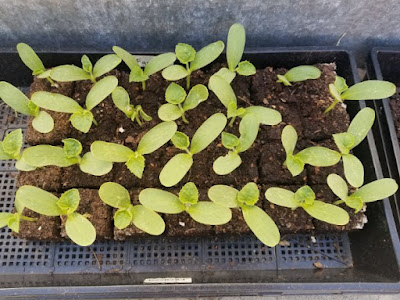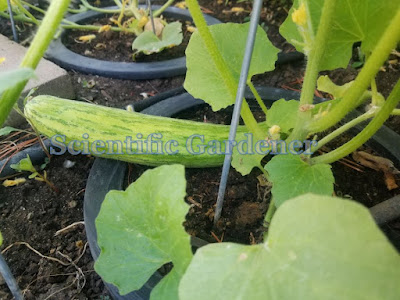Sometime after 1500, after Italian sailors had colonized the islands around Sardinia, they brought over a group of Tunisians from Africa to colonize the area. Along with other things, these Tunisians brought with them seeds of a long somewhat striped cucumber that they called “Faguss” or “Faqous”, which in Arabic means “cucumber”. While the cucumber did very well in its new land, the Tunisians did not. Over time conflict erupted between the Italian sailors and colonists on one side and the once-native Tunisians, who were sent back to their homeland. One thing that was not sent back to Tunisia was the splotchy striped cucumber. Now in the hands of the Italians, the colonists continued to grow this summer fruit under the Italianized name of Facussa.
Primarily grown on the island of San Pietro, Sardinia, the Facussa is a light slender Armenian-type cucumber that exhibits bands of dark splotching. In Italy, longer Armenian-type cucumbers are referred to as Tortarello. This specific Cucumis melo variety flexuous is picked immature from heat-loving vines that produce a continuous harvest of long beautiful fruit. The main town on San Pietro Island, Carloforte, which was founded sometime around 1738 still offers this variety in its markets from June through late August.
Unfortunately, due to some health concerns I am not able to visit the town of Carloforte in mid to late summer when these cucumbers are prolific. Despite my inability to travel to the isolated island, and due to a fortunate series of events that required many months to transpire (along with divine intervention) I was gifted some seed of the Facussa. I will say that, even with help from others, anything worthwhile in life often requires a great deal of effort.
In order to ensure the success of the Facussa, I started it as soon as possible after planting out the seedlings in my Mezzo Lungo carosello trial, around May 7th. This was both good and bad. It was good, because it allowed me a long amount of time to care for the plants before planting. It was bad because the plot that these plants was to be grown in was not ready when anticipated. I had to pot up my plants from 2 inch soil blocks to 4 inch strawberry tills to 10 inch hydroponic baskets while waiting for a spot for the plants to open up. The difference of time required to plant a 2 inch soil block is significantly less than planting a 10 inch hydroponic basket. While a 2” soil block requires a couple minutes to plant, a 10” hydroponic basket can require 15-20 minutes or more to plant each basket. The issue is not as much getting the hole dug or the basket level as ensuring that the soil is in contact with the entire basket. Ensuring full contact between the basket and the soil is especially difficult when working with clumpy clay soil.
I planted at least a dozen basket transplants in the fertile garden and at least half a dozen in the chicken garden around June 7th and hoped for the very best while I went on a long-anticipated 6-week family trip across the United States.
After around 5 weeks, I returned to find that most all of the plants were doing quite well. It was some work to pull the sprawling plants apart enough to trellis them, but after several days, I was able to clean up the vines enough that each plant took up a little more space than a conventional tomato cage.
The color and shape of the Facussa did not disappoint. They were both long and beautiful. Most of them were very slender. I tried a few – which were very tasty - and left the remainder of the plants until around August 12th to set mature seed.
Overall, I would say that the texture of the Facussa is very similar to the Dark Armenian cucumber or Tortarello Scuro Barese. It is not quite as nice as the Striped Armenian (AKA Painted Serpent) or as unpleasant as the light Armenian cucumber (AKA Tortarello Abruzzese). As a fun, tasty beautiful cucumber, it is well worth growing out.

















































































































